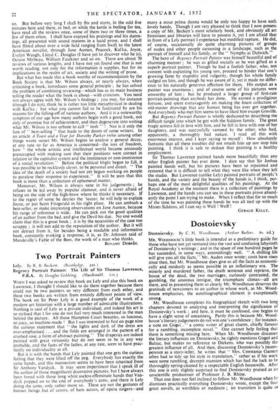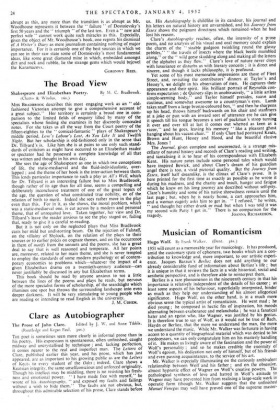Dostoiev sky
Dostoievsky. By C. M. Woodhouse. (Arthur Barker. 8s. 6d.) MR. WOODHOUSE'S little book is intended as a preliminary guide for those who have not yet ventured into the vast and confusing labyrinth of Dostoievsky's writings ; and in the space of one hundred pages he has succeeded, in some ways, astonishingly well. " A shilling life will give you all the facts," Mr. Auden once wrote; costs have risen since then, but Mr. Woodhouse does give us all the facts as economi- cally and, modestly as seems possible in an inflationary era. The miserly and murdered father, the death sentence and reprieve, the house of the dead, the two marriages, curiously contrasted, the gambling, the amorous intrigue, the triumphant climax—all are there, and in presenting them so clearly Mr. Woodhouse deserves the gratitude of newcomers to an author in whose work, as Mr. Wood- house emphasises, the autobiographical element is exceptionally strong.
Mr. Woodhouse completes his biographical sketch with two long chapters devoted to analysing and interpreting the significance of Dostoievsky's work ; and here, it must be confessed, one begins.to have a slight sense of uneasiness, Partly this is because Mr. Wood- house's literary judgements do not win one's confidence ; for instance, a- note on Gogol . " a comic writer of great charm, chiefly famous for a rambling, incomplete novel." One cannot help feeling that there is something missing here. When Mr. Woodhouse discusses the literary influences on Dostoievsky, he rightly mentions Gogol and Balzac, but makes no reference to Dickens, who was possibly the greatest influence of all. And then, discussing Dostoievsky's incom- petence as a story-teller, he writes that " Mrs. Constance Garnett often had to tidy up his style in translation," rather as if his work were some rambling, decrepit mansion which has had the luck to be thoroughly spring-cleaned by a respectable English housewife. After this one is only slightly surprised to find Dostoievsky praised as an unscientific predecessor of Professor J. B. Rhine.
Thus one does not feel inclined to follow Mr. Woodhouse when he dismisses practically everything Dostoievsky wrote, except the four great novels, as worthless or mediocre ; no transition is quite as
abrupt as this, any more than the transition is as abrupt as Mr. :Woodhouse represents it between the " failure " of Dostoievsky's first 50 years and the " triumph " of the last ten. Even a " new and perfect wife " cannot work quite such miracles as this. Especially, given the object of Mr. Woodhouse's book, one regrets his dismissal of A Writer's Diary as mere journalism containing nothing of major importance. For it is certainly one of the best sources in which we can see in their raw state some of Dostoievsky's most fundamental ideas, like some great diamond mine in which, embedded amongst dirt and rock and rubble, lie the strange gems which would bejewel the Karamazovs.
GORONWY REFS.







































 Previous page
Previous page